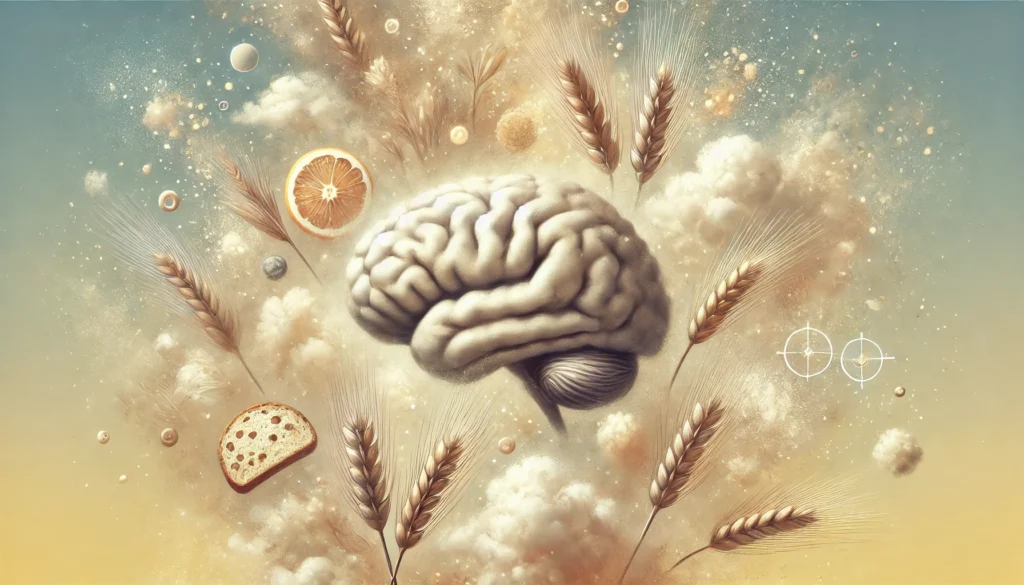Introduction: The Pervasive Impact of Gluten on Cognitive Function
In recent years, the connection between diet and cognitive performance has garnered significant attention, with gluten often at the center of these discussions. Gluten brain fog is a phenomenon that many individuals experience, characterized by confusion, forgetfulness, difficulty concentrating, and a general sense of mental cloudiness. This condition is frequently reported by individuals with celiac disease, gluten sensitivity, and other gluten-related disorders. Understanding the intricate relationship between gluten and brain function is essential for developing effective remedies and improving mental clarity.
You may also like: Keto Brain Fog: Why It Happens & How to Beat Mental Fatigue on a Low-Carb Diet
Gluten, a protein found in wheat, barley, and rye, can trigger adverse immune responses in susceptible individuals. While gastrointestinal symptoms are the most commonly recognized manifestations of gluten intolerance, the neurological impact of gluten consumption is becoming increasingly evident. Gluten brain fog affects not only those with diagnosed celiac disease but also individuals with non-celiac gluten sensitivity (NCGS). The cognitive symptoms associated with gluten consumption can significantly impair daily functioning, academic performance, and professional productivity.
This article explores the underlying causes of gluten brain fog, examining how gluten interacts with the brain and nervous system. We will delve into the immune response, the gut-brain axis, and the role of inflammation in cognitive impairment. Additionally, we will discuss the relationship between gluten and brain function, exploring the mechanisms through which gluten contributes to mental fog. Finally, we will provide evidence-based strategies and remedies to alleviate symptoms, empowering readers to make informed dietary and lifestyle choices for optimal cognitive health.
Understanding Gluten Brain Fog: What Is It and Who Is Affected?
Gluten brain fog refers to a state of mental confusion and cognitive dysfunction triggered by gluten consumption. This condition manifests through various symptoms, including poor concentration, memory lapses, mental sluggishness, and an inability to process information efficiently. Although brain fog is not a medical diagnosis, it serves as a descriptive term for these cognitive impairments.
Individuals most commonly affected by gluten brain fog include those with celiac disease, non-celiac gluten sensitivity, and wheat allergy. Celiac disease is an autoimmune disorder in which gluten ingestion damages the small intestine, while non-celiac gluten sensitivity involves an adverse reaction to gluten without intestinal damage. Wheat allergy, on the other hand, triggers an immune response to wheat proteins, potentially affecting cognitive function.
The prevalence of gluten brain fog underscores the importance of understanding its underlying mechanisms. Research indicates that individuals with gluten sensitivity may experience brain fog due to immune activation, systemic inflammation, and disruptions in the gut-brain axis. These processes compromise neuronal function, resulting in the characteristic cognitive symptoms associated with gluten brain fog.

The Immune Response: How Gluten Triggers Cognitive Impairment
The immune system plays a pivotal role in the development of gluten brain fog. When individuals with celiac disease consume gluten, their immune system identifies the protein as a threat, initiating an inflammatory response. This process damages the intestinal lining, impairing nutrient absorption and triggering systemic inflammation.
In non-celiac gluten sensitivity, immune activation occurs without intestinal damage. Research suggests that gluten peptides may breach the intestinal barrier, entering the bloodstream and activating immune cells. This response releases pro-inflammatory cytokines, such as interleukin-6 (IL-6) and tumor necrosis factor-alpha (TNF-α), which can cross the blood-brain barrier and disrupt neuronal function.
The inflammatory response triggered by gluten consumption affects brain function by altering neurotransmitter activity, impairing synaptic communication, and promoting oxidative stress. Elevated cytokine levels have been associated with cognitive deficits, mood disturbances, and memory impairments, contributing to the experience of gluten brain fog.
The Gut-Brain Axis: A Critical Connection
The gut-brain axis, a bidirectional communication network between the gastrointestinal tract and the brain, plays a crucial role in cognitive health. Gluten-induced intestinal inflammation can disrupt this axis, contributing to brain fog.
The gut microbiome, composed of trillions of microorganisms, influences brain function through the production of neurotransmitters, immune modulation, and maintenance of the intestinal barrier. Gluten consumption can alter microbiome composition, reducing beneficial bacteria and promoting dysbiosis. This imbalance increases intestinal permeability, often referred to as “leaky gut,” allowing gluten peptides and inflammatory molecules to enter the bloodstream.
Once these molecules reach the brain, they can interfere with neurotransmitter signaling, particularly involving serotonin, dopamine, and gamma-aminobutyric acid (GABA). Disruptions in these neurotransmitter systems contribute to cognitive impairments, mood disturbances, and the characteristic mental fog associated with gluten sensitivity.
Inflammation and Neuroinflammation: The Role of Cytokines
Neuroinflammation, or inflammation within the brain, is a key contributor to gluten brain fog. Cytokines released during the immune response can activate microglial cells, the brain’s resident immune cells. Activated microglia produce additional inflammatory mediators, perpetuating a cycle of inflammation and neuronal dysfunction.
Chronic neuroinflammation can impair synaptic plasticity, the brain’s ability to adapt and form new connections. This impairment underlies difficulties in learning, memory retention, and cognitive flexibility. Moreover, prolonged inflammation can damage the blood-brain barrier, further exposing the brain to harmful substances and exacerbating symptoms of gluten brain fog.
Gluten and Brain Function: Mechanisms of Cognitive Impairment
The interaction between gluten and brain function involves several mechanisms, including immune activation, neurotransmitter disruption, and oxidative stress. Gluten peptides can mimic molecular structures found in neural tissue, leading to cross-reactive immune responses. This phenomenon, known as molecular mimicry, results in the immune system attacking both gluten and neuronal structures, contributing to cognitive symptoms.
Additionally, gluten consumption can affect cerebral blood flow. Research indicates that individuals with gluten sensitivity may experience reduced blood flow to specific brain regions, particularly the prefrontal cortex. This reduction impairs executive functions such as decision-making, attention, and working memory, further contributing to the experience of brain fog.
Oxidative stress, characterized by an imbalance between free radicals and antioxidants, also plays a role in gluten brain fog. Gluten-induced inflammation increases free radical production, damaging neuronal membranes, proteins, and DNA. This damage disrupts neuronal communication and contributes to cognitive impairments.

Celiac Disease and Brain Fog: A Complex Relationship
Celiac disease and brain fog share a well-established connection. Individuals with celiac disease frequently report cognitive symptoms, even when gastrointestinal symptoms are well-managed. The relationship between celiac disease and brain fog arises from immune activation, nutrient deficiencies, and systemic inflammation.
Gluten consumption in celiac disease triggers an autoimmune response that damages the intestinal lining, impairing nutrient absorption. Deficiencies in essential nutrients, such as iron, folate, vitamin B12, and magnesium, can negatively impact cognitive function. For instance, vitamin B12 plays a critical role in myelin synthesis, a process essential for efficient neuronal communication.
Moreover, individuals with celiac disease often exhibit elevated levels of anti-gluten antibodies, which can cross-react with brain tissue. This immune-mediated response contributes to neuroinflammation, disrupting neurotransmitter signaling and impairing cognitive performance.
Non-Celiac Gluten Sensitivity and Mental Fog
Non-celiac gluten sensitivity (NCGS) presents with symptoms similar to those of celiac disease but without intestinal damage. Brain fog is a hallmark symptom of NCGS, highlighting the neurological impact of gluten consumption.
The mechanisms underlying brain fog in NCGS involve immune activation, increased intestinal permeability, and alterations in gut microbiota. Research suggests that gluten consumption in sensitive individuals can activate peripheral immune cells, releasing cytokines that affect brain function. Additionally, dysbiosis and leaky gut contribute to systemic inflammation, promoting cognitive dysfunction.
Individuals with NCGS may experience fluctuating cognitive symptoms, with brain fog intensifying following gluten consumption. This temporal relationship underscores the importance of dietary interventions in managing symptoms.
Gluten Allergy Brain Fog: Understanding Allergic Responses
Gluten allergy brain fog can occur in individuals with wheat allergy, an IgE-mediated immune response to wheat proteins. Unlike celiac disease or NCGS, wheat allergy involves immediate hypersensitivity reactions, including respiratory, dermatological, and gastrointestinal symptoms. However, cognitive symptoms such as brain fog can also manifest.
The allergic response triggers histamine release, which can affect neurotransmitter function and promote neuroinflammation. Histamine dysregulation has been linked to cognitive impairments, mood disturbances, and fatigue. Additionally, immune activation during allergic reactions can disrupt blood-brain barrier integrity, contributing to mental fog.
How Long Does Gluten Brain Fog Last?
The duration of gluten brain fog varies depending on individual factors such as sensitivity severity, immune response, and overall health status. In individuals with celiac disease or NCGS, brain fog can persist for hours, days, or even weeks after gluten exposure.
Recovery time depends on the resolution of inflammation, restoration of gut integrity, and normalization of neurotransmitter function. Implementing a strict gluten-free diet is essential for symptom resolution. In some cases, additional interventions such as anti-inflammatory supplements, probiotics, and cognitive rehabilitation may be necessary to expedite recovery.
Effective Remedies for Gluten Brain Fog
Managing gluten brain fog requires a multifaceted approach, addressing dietary factors, gut health, and cognitive support. The following strategies can help alleviate symptoms and promote mental clarity:
Adopting a Gluten-Free Diet
Eliminating gluten from the diet is the cornerstone of gluten brain fog management. A strict gluten-free diet prevents immune activation, reduces inflammation, and supports gut-brain axis integrity. Individuals with celiac disease must adhere to this dietary regimen for life to prevent intestinal damage and neurological complications.
When transitioning to a gluten-free diet, it is essential to scrutinize food labels, as gluten can be present in processed foods, sauces, and condiments. Cross-contamination should also be avoided, particularly when dining out or preparing meals in shared kitchens.
Supporting Gut Health
Optimizing gut health is crucial for restoring cognitive function. Probiotics, prebiotics, and fermented foods can promote a balanced microbiome, reducing inflammation and enhancing neurotransmitter production. Additionally, incorporating fiber-rich foods supports microbial diversity and intestinal barrier integrity.
Bone broth, glutamine supplements, and anti-inflammatory nutrients such as omega-3 fatty acids can aid in repairing intestinal damage and reducing brain fog symptoms.
Enhancing Brain Function
Cognitive performance can be improved through targeted interventions, including nootropics, brain-training exercises, and stress management techniques. Nootropics such as phosphatidylserine, acetyl-L-carnitine, and bacopa monnieri have demonstrated potential in supporting memory, attention, and mental clarity.
Regular physical activity, adequate sleep, and mindfulness practices contribute to neuroplasticity and cognitive resilience. Additionally, cognitive training programs can enhance executive functions, mitigating the effects of gluten brain fog.

Frequently Asked Questions (FAQ) on Gluten Brain Fog
1. What is gluten brain fog, and why does it affect mental clarity?
Gluten brain fog refers to the cognitive cloudiness experienced by individuals sensitive to gluten. While the primary mechanisms involve immune responses and neuroinflammation, the psychological impact of chronic brain fog should not be overlooked. Cognitive impairments, such as reduced attention span and slower information processing, can contribute to increased frustration and anxiety. Long-term exposure to gluten can alter the brain’s neurochemical balance, particularly in areas responsible for executive functioning and memory. Addressing gluten brain fog requires not only dietary adjustments but also strategies that enhance cognitive resilience, such as mindfulness practices and mental exercises.
2. Does gluten cause brain fog in individuals without celiac disease?
While gluten brain fog is most commonly associated with celiac disease, individuals without this condition can also experience cognitive symptoms. Research suggests that gluten can impact brain function through pathways unrelated to intestinal damage, especially in cases of non-celiac gluten sensitivity. In these individuals, gluten triggers systemic inflammation, which can lead to temporary cognitive dysfunction. Additionally, psychological stress and anxiety related to dietary changes might exacerbate the perception of mental fog. Identifying gluten brain fog remedy options, including gut health optimization and cognitive training, can benefit both celiac and non-celiac individuals.
3. How does gluten affect brain function over the long term?
Long-term exposure to gluten in sensitive individuals can contribute to chronic neuroinflammation and structural changes within the brain. Studies have indicated that persistent brain fog gluten sensitivity might accelerate cognitive decline, particularly in individuals predisposed to neurodegenerative diseases. Gluten and brain function are closely linked through the gut-brain axis, where sustained inflammation can affect hippocampal activity, crucial for memory formation. Adopting a gluten-free diet early can help mitigate these risks, potentially preserving cognitive abilities later in life.
4. How long does gluten brain fog last after gluten exposure?
The duration of gluten brain fog varies based on individual factors such as immune response intensity and gut health. In many cases, symptoms subside within a few hours to a few days after gluten consumption. However, in individuals with celiac disease and brain fog, cognitive symptoms may persist for weeks due to prolonged immune activation and intestinal damage. Rebalancing the gut microbiome through probiotics and anti-inflammatory interventions can expedite recovery, illustrating the importance of personalized dietary strategies for individuals dealing with foggy brain celiac symptoms.
5. Can gluten cause foggy brain even in individuals with no diagnosed gluten sensitivity?
Emerging research indicates that gluten can cause foggy brain symptoms in individuals without diagnosed gluten sensitivity. Some researchers hypothesize that gluten affects neurotransmitter function by influencing gut bacteria composition. Gluten and the brain interact through complex immune pathways, potentially triggering temporary cognitive impairments in susceptible individuals. Additionally, high-gluten diets might indirectly contribute to brain fog by promoting insulin resistance, which affects brain metabolism. Exploring dietary patterns and monitoring cognitive performance can help identify potential gluten-related triggers.
6. What are the primary differences between celiac brain fog and gluten mental fog?
Celiac brain fog typically stems from autoimmune responses triggered by gluten ingestion, resulting in systemic inflammation and nutrient malabsorption. In contrast, gluten mental fog in individuals without celiac disease is often linked to immune activation without intestinal damage. The neurological impact, however, can be similar, with both conditions potentially causing memory lapses, reduced focus, and mental sluggishness. Understanding these differences is essential for developing effective management strategies, particularly for individuals experiencing persistent symptoms despite adhering to a gluten-free diet.
7. How can psychological techniques help alleviate gluten brain fog?
Psychological techniques, such as cognitive behavioral therapy (CBT) and mindfulness meditation, can complement dietary interventions for gluten brain fog. Chronic brain fog often leads to frustration and self-doubt, which further impair cognitive performance. CBT can help individuals reframe negative thought patterns, while mindfulness practices reduce stress and improve attentional control. Additionally, engaging in novel cognitive activities, like learning a new language or playing a musical instrument, can enhance neuroplasticity and support brain recovery in individuals with gluten intolerance.
8. What role does stress play in gluten brain fog?
Stress can significantly exacerbate gluten brain fog by disrupting the gut-brain axis and increasing intestinal permeability. Cortisol, the primary stress hormone, affects immune regulation and gut microbiome composition, potentially intensifying cognitive symptoms. For individuals with brain fog gluten intolerance, stress reduction techniques such as yoga, deep breathing exercises, and nature exposure can support cognitive clarity. Managing stress holistically ensures that the immune system remains balanced, reducing the risk of gluten-induced mental fog.
9. Are there advanced tools to track gluten brain fog symptoms?
Several digital tools and applications now allow individuals to monitor brain fog symptoms and dietary patterns. Cognitive performance apps can track attention, memory, and processing speed, providing insights into symptom fluctuations. For individuals with gluten allergy brain fog, wearable devices that measure heart rate variability (HRV) can help assess stress levels, which often correlate with cognitive symptoms. Data from these tools can guide dietary adjustments and support more personalized management strategies.
10. How can individuals distinguish gluten brain fog from other cognitive conditions?
Distinguishing gluten brain fog from other cognitive conditions requires a comprehensive evaluation of symptom patterns, dietary history, and immune markers. Unlike conditions such as ADHD or chronic fatigue syndrome, gluten brain fog typically correlates with gluten intake and resolves upon dietary modification. Neurological testing, blood tests for gluten-related antibodies, and elimination diets can help confirm the diagnosis. Consulting a healthcare professional ensures accurate identification and effective treatment for brain fog gluten sensitivity.
Conclusion: Empowering Cognitive Health Through Dietary Awareness
Gluten brain fog represents a significant challenge for individuals with gluten-related disorders, impacting cognitive performance, productivity, and overall well-being. Understanding the mechanisms underlying this phenomenon—from immune activation to gut-brain axis disruption—provides valuable insights into effective management strategies.
A gluten-free diet, combined with gut health optimization and cognitive support, can alleviate brain fog and enhance mental clarity. Ongoing research continues to shed light on the complex relationship between gluten and brain function, emphasizing the importance of individualized dietary approaches.
By recognizing the impact of gluten on cognitive health and implementing evidence-based remedies, individuals can reclaim mental clarity and improve their quality of life. Awareness, education, and proactive lifestyle adjustments empower individuals to navigate the challenges of gluten brain fog, fostering long-term cognitive resilience and well-being.
Further Reading:
Celiac Disease Symptoms: Brain Fog
Brain fog and non-coeliac gluten sensitivity: Proof of concept brain MRI pilot study
Gluten-Free Diet and Brain Fog in Those Without Celiac Disease
Important Note: The information contained in this article is for general informational purposes only, and should not be construed as health or medical advice, nor is it intended to diagnose, prevent, treat, or cure any disease or health condition. Before embarking on any diet, fitness regimen, or program of nutritional supplementation, it is advisable to consult your healthcare professional in order to determine its safety and probable efficacy in terms of your individual state of health.
Regarding Nutritional Supplements Or Other Non-Prescription Health Products: If any nutritional supplements or other non-prescription health products are mentioned in the foregoing article, any claims or statements made about them have not been evaluated by the U.S. Food and Drug Administration, and such nutritional supplements or other health products are not intended to diagnose, treat, cure, or prevent any disease.


